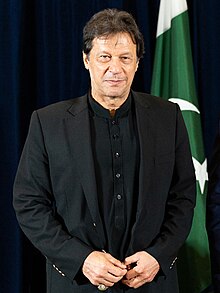Imran khan Full History
Imran Khan
Imran Ahmed Khan Niazi HI(M) PP (Urdu/Pashto: عمران احمد خان نیازی; born 5 October 1952) is a Pakistani politician and former cricketer who served as the 22nd prime minister of Pakistan from August 2018 until April 2022, when he was ousted through a no-confidence motion. He is the founder and chairman of the Pakistan Tehreek-e-Insaf (PTI), one of the largest political parties in the country.
Born to a Niazi Pashtun family in Lahore, Khan graduated from England's Keble College in 1975. He began his international cricket career at age 18, in a 1971 Test series against England. Khan played until 1992, served as the team's captain intermittently between 1982 and 1992,[5] and won the 1992 Cricket World Cup, in what is Pakistan's first and only victory in the competition. Considered one of cricket's greatest all-rounders,[6][7] Khan scored 3,807 runs and took 362 wickets in Test cricket and was inducted into the ICC Cricket Hall of Fame. Khan founded cancer hospitals in Lahore and Peshawar,[8]and Namal College in Mianwali,[9][10] prior to his ascent in politics.[11][12] He founded the Pakistan Tehreek-e-Insaf (PTI) in 1996, which won a seat in the National Assembly in 2002, and saw Khan serve as an opposition member from Mianwali until 2007. PTI boycotted the 2008 election, but in the subsequent election, became the second-largest party by popular vote.[13][14] In the 2018 general election, running on a populist platform, PTI emerged as the largest party in the National Assembly, and formed a coalition government with independents with Khan as Prime Minister.
During his government, Khan addressed a balance of payments crisis with a bailout from the International Monetary Fund.[15] He presided over a shrinking current account deficit,[16][17] and limited defence spending to curtail the fiscal deficit,[18][19]leading to some general economic growth.[20] He enacted policies which increased tax collection[21][22] and investment,[23] and reforms were made to the social safety net. His government committed to a renewable energy transition, launched a national reforestation initiative and expanded protected areas, and led the country during the COVID-19 pandemic. However, his failure to revive the economy and the rising inflation rate caused him political problems.[24] Despite his promised anti-corruption campaign, the perception of corruption in Pakistan worsened during his rule.[25] He was accused of political victimisation of opponents and clamping down on freedom of expression and dissent.[26]
In foreign relations, he dealt with border skirmishes against India and strengthened relations with Chinaand Russia,[27] while relations with the United Statescooled. Following the Taliban takeover of Kabul in 2021, Khan congratulated the Taliban for their victory in the 2001–2021 war, and urged the international community to support their new government.[28][29][30] He was also sympathetic to the Pakistani Taliban (Tehreek-i-Taliban Pakistan or TTP), and stated his government was in talks with them in order to negotiate a peace deal with TTPwith the help of the Afghan Taliban.[31][32] On 10 April 2022, Khan became the country's first prime minister to be deposed through a no-confidence motion in parliament.




Comments